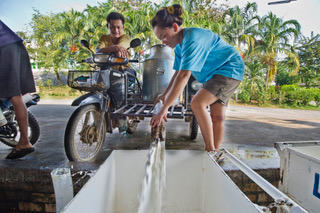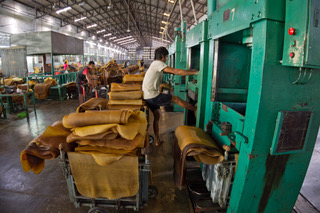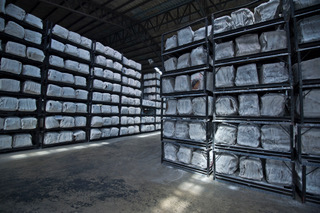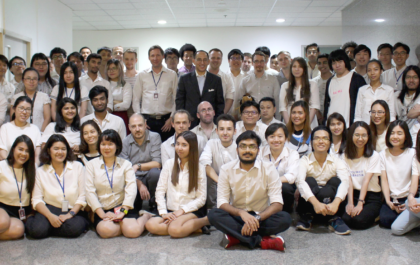Suharsh Mittal is the epitome of a self-made person.
His journey has taken him from India to Africa to the UK, before finally settling in Thailand where after a stint as a professional, he took the plunge into entrepreneurship right before the biggest financial crisis that Thailand has faced. Despite the timing, Oriental Rubber thrived and today is one of the leading exporters of natural rubber, a pervasive commodity that is used in industries like tires, condoms, medical gloves and rubber bands. This is a great interview and we touch on topics like luck, karma, hard work and financial sense and the role they play in entrepreneurial success.
Enjoy!
Genup: Tell us about yourself.
SM: So, let me start with who I am. My name is Suharsh, and I got to Thailand in 1992. At that time, I had been very fortunate to have lived in various parts of the world. That is, I started in India, was born there in Amritsar and then left when I was 13, moved to Zambia in Africa and from there to London, England. Stayed in England for 3 to 4 years, didn’t really like it, and this is something I can say now in retrospect.

At the time though, I was so thrilled to be part of this first world country, you know, the idea of being there, doing the England thing. I was 17 then, by the way, when I left my home in Zambia and went to England. And thereafter got to Bangkok in 1992. In fact, I was simply visiting my uncle here who’s now been here for 50 years. Everyone in my family had been to see him by then except for me, so I decided to come here along with my cousin. And that was the first time I set foot in Thailand. And now at this grand old age of 50, love being in Thailand. As I said earlier, I was 13 when I left India and I was still in school then. And it was very interesting because when I reached Zambia, I was part of the local school system there for a year. Generally, the system in Zambia was that most of the expatriate kids there went abroad to study. This was because most of them worked for the copper mines and they offered the expats those benefits. However, my dad worked for a private company there and so did not get the same perks. And we couldn’t afford it. So, the next best alternative was to study for your GCE ‘O’ and ‘A’ levels. Meaning you just had private tutors who would teach you the whole syllabus. And they had centers in Zambia where you could write the O and A levels at exactly the same day and time as the students in England. So, we wrote the same paper except that we studied for it all on our own. So after doing that one year of secondary school at a local school, I basically started to self-study. And so I did the O levels and at that time I wanted to be an accountant. I don’t know why but It was so clear an ambition in my mind then. Well, maybe because my uncles were accountants and I looked up to them. And I never had a science or technical mind and numbers were definitely my thing. We never thought that far anyway, I just knew that this is what I want to study, and I want to get a job doing it.

Genup: What was then your initial spark? What made you want to go the entrepreneurial path rather than get a job?
SM: So fortunately, I qualified as an accountant, got my chartered management accountancy from the UK. That’s a four-stage process. So, O levels, A levels and 3 chartered accountancy stages, I did all this in Africa through self-study. So, the point to be noted here is that I never went to university. And then for the 4th stage of the certification, I went to the UK. So, the idea was that once I qualified, I would get a job there. So, I left home with, I think 500 pounds that my dad gave me and of course a ticket. And that was it. So, I got to England and one of my uncles there connected me to one of his friends who had a pizza place and I used to work there doing his books. And that helped me to stay afloat in the UK. And within 6 months of getting there I had qualified and I continued to work. Unfortunately, this was illegal because I didn’t have a work permit. And this totally sucked. It sucked to be a professional and have that sword hanging on your head that said that just because you don’t have a work permit, you are some sort of an alien or some sort of an illegal guy doing something wrong. And it was so derogatory and a lousy and terrible feeling, so maybe this contributed to the dislike that I developed for England. Apart from the shitty weather etc. But yeah, anyway, I took a holiday to Thailand. And we got here, and I asked my uncle, the one who lived here that I wanted to go and see a factory. And he had a good friend who owned a rubber factory. This person, who I still hold as one of my gurus today, allowed me to visit the factory in Surat Thani in the south of Thailand. I knew nothing about rubber then and it really didn’t matter because all I wanted was to visit a factory. So, I went there for 2 or 3 days and just as a courtesy after that, I wrote a little report about what I saw, and I submitted it to the owner. I just related what I saw there, my observations, my thoughts, some possible improvements from my own point of view. Not that I knew anything about anything at that point anyway, but I wrote some things up and gave it to him. And then I continued on my holiday to Phuket and other places. When I got back to Bangkok, my aunt told me that the owner of the rubber factory called, and he wanted to see me. So, I went to see him, and he offered me a job. And like I said, I didn’t care too much for England anyway, and after consulting with my uncle I accepted the job. And that’s how my rubber journey started in 1992. I worked there for 4 years until 1996 when I got married.
I’m a firm believer that when two people get married, there’s a whole new constellation of stars that emerges and that is what happened for us. I got back from the wedding and my immediate boss, with whom I wasn’t really getting along told me that he wanted to demote me to do another job. I obviously did not want this so I went back to see the owner again who after listening to me told me not to worry and that he would give me another role, with a bigger responsibility. But that new responsibility required me to travel 20 days a month. So, I asked to be adequately compensated for that which he did not agree to. And so, I had to quit my job. At this stage, which was around 1994 – 1995 I had started to do the MIM, the Masters in Marketing at Thammasat University, the evening course. Because I had always wanted to combine my numbers and figures knowledge with marketing skills which I thought was a great mix. And it was working out nicely. And in 1996 I was getting to the end of the degree and guess what, around that time the person running the program told me that one of the corporates that sponsored the degree was offering a one-year scholarship to Oxford. So, after discussing with my wife, Sonali, I decided to put my name in the hat.
And they gave it to me. At least verbally.
After congratulating me etc., he asked me if I was Thai. When I told him that I was not Thai, they pulled the scholarship back.
It was so close and yet so far and our whole world came crashing down. We had already started making plans that we would go and do this thing, just the two of us. But only three days later, boom it all fizzled out. I did write letters pleading my position, but they could not change the rules. So that was that. And of course, at the same time I was having problems with this guy, my immediate boss and the owner.
So here I was, newly married and virtually without a job. I went back to interviewing with other companies and finally got accepted by Cargill, a big commodities trader. But the money they were giving me was even less than what I was making, and so I really couldn’t settle for that.
At that time my wife, Sonali, mentioned to me how I’ve always had the idea to do my own thing, and isn’t this the right time to do it? We thought about it for a bit and since we had some savings that we had put aside for a rainy day, we decided that it would be a risk worth taking. If we failed, we could just come back and get jobs. At least that’s what we thought at the time. And that’s the power of a good education behind you, you have the confidence that you can always go out there and get a job. We were born of a service mode, everyone in our family was a professional, none were entrepreneurs. This was at that time, and at that time we didn’t see this on those terms, but we were really stepping out of that security envelope. And to take this one step further, my learning was that of an accountant. We’re bean counters, very conservative, all we see are numbers. We don’t even see the world outside of numbers, well at least I didn’t see. So, although I kept saying that one day, I want to have my own business, I really didn’t mean it. I didn’t really know what it meant to have your own business. Sonali is from a business background, though and she told me to give it a go.
So, we started our company on the 12th of July 1996, right before the 1997 crash, the Tom Yum Kung crisis. We got a small little office. There was Sonali, myself and one more person. And we just dived into it.

Genup: What is your business about? What do you do?
SM: Our business is the export of Natural rubber as a raw material. So just one stage from the tree. The farmer taps the tree, takes out the white liquid, it’s then processed one step further into liquid latex or sheets or crumb rubber. That’s the part that we buy and export. We trade. We have no manufacturing. We just buy and sell. But we specialize in natural rubber only. That’s all we do.
Genup: Who are your customers?
SM: The biggest use of natural rubber, the biggest application is in the tyre industry. So pretty much 50% of a car tyre is natural rubber. Apart from that there are whole lot of things that use rubber. Auto parts, shoe soles, gloves, condoms etc. There could be many types of customers, there could be dealers who buy for the end users, but our business model is based on trying to sell to the end user. So, it can be a factory that uses the rubber to produce something.

Genup: How do your customers find you?
SM: A combination of self-promotion, web site etc. Travel, word of mouth, trade shows.
Genup: What was your bigger hurdle when you started and how did you overcome them?
SM: Let’s look at it this way. What we were doing was commodities. And commodities like natural rubber, fortunately or unfortunately has a pretty big ticket. So just to give you a little example, one container of natural rubber can run from $20k to $50k. If you thought about the equity that we brought to the business, it was maybe only 2 containers worth. So, finance was a big limiting factor for us. And there was no bank out there who was willing to lend us any money. We had no VC, angel funding. The way that things happened was twofold. One was we had some godlike suppliers who gave us credit. They really supported us even though they didn’t have to. Yes, during my employment, I got to know them, and they had become friends, but I’m not Thai and if I had run away there would’ve been no way for them to find me. So, there was no reason for them to give me credit. But there were extremely generous and trusting. I had good luck. So, they said, here you go, here’s the rubber, sell it and then pay us. Two, fortunately for us, we did get some customers who paid us in advance. So, we got very lucky. We slowly grew from there with financing from suppliers and customers. And of course, given the fact that I have training as an accountant, I made sure that we counted the pennies, and made sure that the numbers were right. Whatever we were earning, we were putting it back. It’s very easy to get sidetracked, and get to a situation where you say hey, money is coming in and let’s spend it etc. But we were very disciplined.
As mentioned, rubber is a commodity and one can really get affected by the wild swings of the prices, but to have the supplier backing, able to get an offer to them. Usually a deal happens very fast, maybe in a few minutes and at least in the first hour. These guys were good enough to give us overnight offers so we had time to make deals. And the customers told us that they would pay us when the vessel reached them. And this could easily take 30 days from when the goods left our supplier to wherever they were headed. We were clear with the supplier and told them where the rubber was going and when we would be able to pay them and they filled that gap for us.

Genup: But what about the gyrations and volatility in the price of the rubber?
SM: Well, surely by the time the deal was made and the time the goods arrived, the customer could go tyrant and say that they didn’t want the goods anyway because the price had fallen. But that fortunately didn’t happen. Yes, it very well could have, but it didn’t. And here I want to make the point that had I known then what I know now, about the high risks in this business, I would not have got into it.
Especially not with my training as an accountant. Because we are taught to be so conservative. It’s a wildly speculative business and my training was very helpful. We were very very disciplined.
Genup: Have you ever experienced a business failure? And how did you bounce back? And did you learn anything?
SM: I think, challenges more than failure. Innumerable challenges. And at the risk of sounding philosophical, my biggest take away has been that everyone wants to be successful, and everyone works hard at being successful. But there is this magic ingredient which you may call luck which plays a pretty big role. And that is something that really attributed to my success. Also, at the same time there is a lot to be said, and this is my personal belief, of karma. Doing the right thing. I believe very strongly that you can’t cheat someone to make a quick buck and then sustain that in life.

As far as challenges go, there are quite a few. There was this one time in the beginning where we had this big order from this customer who had paid us in advance. We had his money. So, because this order was to be shipped in 4 or 5 months, we decided to put this money into a finance institution, non-bank finance company, because we would get a good interest on that money.
The owner of this finance company was well known to me, he was a good friend of mine. So, I put the money there and a month later the company got shut down by the government. So, you imagine a situation where you have an order in hand and you’ve taken someone’s money and now how do you execute it?

So, our backs were against the wall. And my friend was very helpful, and he helped me get the money out, we lost a little bit, not too much. And we went back to the suppliers, told them the story and again they were there as our supporters and they extended our credit terms some more. And that’s what we did.
Genup: How do you stay motivated? What drives you?
SM: I would like to answer this question not specifically related to work but to life in general. I think we’re very, very, very fortunate to be where we are. And with the Almighty’s blessings we have a great life. So, this life is my motivation. I’m motivated to get up every day and live. And that’s what keeps us going. Every single day.


Genup: Who do you admire?
SM: Honestly speaking and I’ve often thought about this. I admire that poor man who’s poor and doesn’t know how he’s going to get three meals a day and yet has a smile on his face. I don’t know how he does that. I have no idea how he does that. And that’s the person I truly admire.
Genup: What don’t you like about being an entrepreneur? What would you tell your younger self about the path he was about to take?
SM: I think one needs to be kind of prepared that you’re going to come to these cross roads many times where you need to make the decision between doing the right thing and not. I would like to tell people to do the right thing even if it means less money. You’re always going to be faced with those decisions, and I’m not being judgmental here, to each his own, but for me being able to sleep well at night was better for me. And to be able to do that is to choose the right path. Just to give you a very small example. In our business, one of the roles we fulfill is trying to read the market and sharing our view with the customer. So, when you see that the market is about to go down, you could tell your customer the other way around and maybe make a big sale. But we’ve never done that. And that’s helped me sleep better at night. Of course, that probably helped our reputation and one of the reasons we’re still in business.
I’m trying to think really hard what I don’t like about entrepreneurship, it is hard. I can’t really come up with something. But if you pushed me, I guess I would say that having to make the above decision that repetitively. Perhaps when you’re an employee, you don’t have to. Someone else is making those decisions, you just deflect them. I guess it is a very flippant way of putting it. But it’s hard to make those decisions all the time. Right now, it is much easier but, in the beginning, it was more difficult.

Genup: What does success in life mean to you?
SM: Success in life means being content. We can very happily say with hands on our hearts that there is nothing we really desire at this stage.
Being able to go to bed and wake up happy. Happy to go out there, not because you’re pursuing more wealth or whatever it is, but happy doing what you’re doing.
That's success.
Genup: What advice would you give someone who’s thinking about pursuing the entrepreneurial path?
SM: It’s really good to know, understand, analyze. But it’s equally good also to be cognizant of the fact that entrepreneurship is a gamble. You need to take that plunge only then you can know. Surely, you can be an employee and have that security envelope, but hey, even that isn’t a guarantee. So I would say, committed professionals look after their responsibilities as if it was their own, so if you’re doing that, then you might as well give a shot at being an entrepreneur since you’re doing that anyway and you even have some money on the line you’ve got some skin in the game.
So I’m encouraging you to take the plunge. Yes, do your homework, and you’re never going to get everything right in the beginning. You have to let things align themselves. But if you do the right things, things can work out for you.
Related posts
1 Comment
Comments are closed.
Today's pick
Hot topics
Welcome to Generation Upstart
It starts with an idea — a fusion of thoughts and experiences, a blending of desires and dreams. Bursts of electricity fueled with faith, love and creativity leap across synapses generating the necessary expression to give it real form and substance. Sometimes, an entrepreneur’s call…
Careerlist: Never Waste a Crisis
According to Michael Scissons, the most important thing you can do to maximize your chance of entrepreneurial success is to build your tribe. Start as early as possible, trimming and pruning like a patient gardener, while continuing to add value to the network. For these…
RingZero: On Employee Satisfaction and Success
Great people make the great teams that make the great workplaces, and Mr. Asmat Yousri is a big believer in people. After all, he has been at this since 1996. An ex-banker, he saw no obstacles transitioning from a corporate position to an entrepreneur. In…





Great content! Super high-quality! Keep it up! 🙂